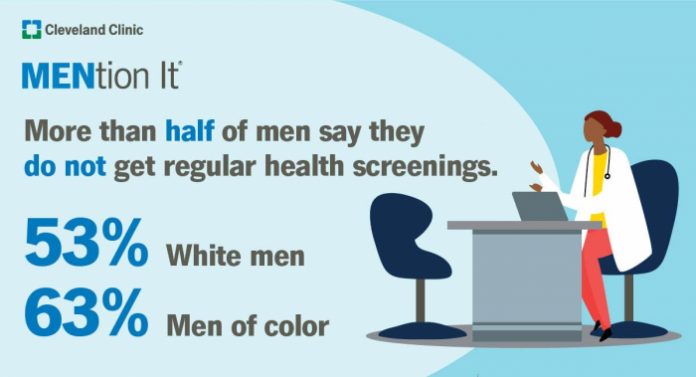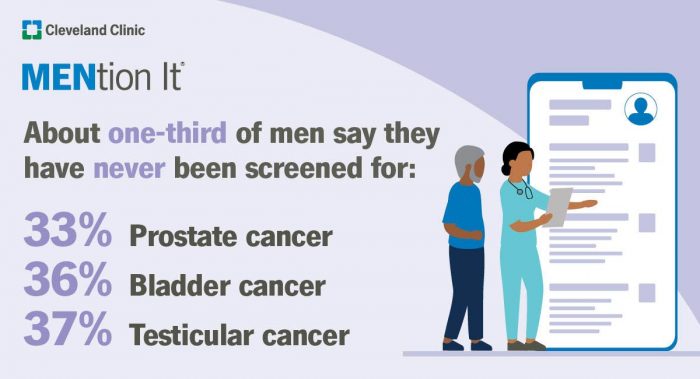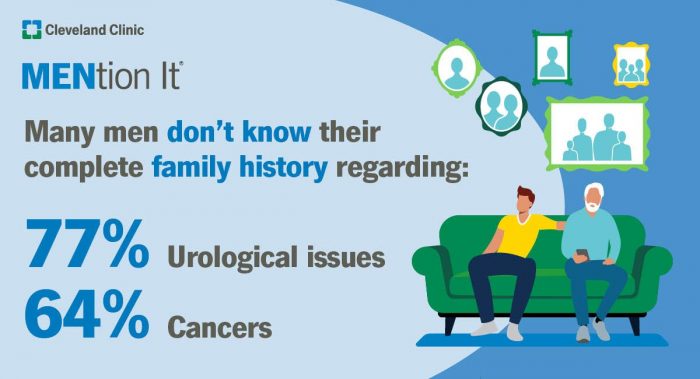
A new national survey by Cleveland Clinic reveals which health issues men are most concerned about as they age, and explores many of the common misconceptions that impact men’s health across all generations.
The survey, which was taken earlier this year by a national sample consisting of 1,000 U.S. males, 18 years of age and older, was issued as part of Cleveland Clinic’s seventh annual educational campaign, MENtion It®. The campaign aims to address the fact that men often do not mention health issues or take steps to prevent them.
Among the top four health issues concerning men as they age, the survey finds 38 percent of men are concerned about cancer and 32 percent are concerned about their sexual health. When it comes to sexual health concerns, 44 percent of men named erectile dysfunction as their top concern.
However, more than half of men incorrectly think that low testosterone is the most common cause of erectile dysfunction. Findings from the survey show 71 percent of men who have experienced issues related to sexual health also have been diagnosed with cardiovascular disease or diabetes.
Despite having these concerns, the survey reveals many men are not proactive when it comes to their health and knowing their family health history. Fifty-five percent of men say they do not get regular health screenings, and the majority of men do not know their complete family history when it comes to cancers (64 percent) and urological issues (77 percent).
Early detection through preventive health screenings and checkups is essential to diagnosing many of these conditions while they are still in early treatable and curable stages.
“We know men tend to avoid seeking routine medical care and are often unaware of many symptoms that can lead to serious health issues if not identified and treated early,” said Georges Pascal-Haber, M.D., Ph.D., interim chairman of Cleveland Clinic’s Glickman Urological & Kidney Institute.
“In this year’s survey, we wanted to gain a better understanding of the main health concerns of men and educate them on the importance of prioritizing their health.”

Key survey findings:
- 32 percent of men are concerned about their sexual health, which include sexual dysfunction (erectile dysfunction, delayed or premature ejaculation, lack of interest in sex, inability to become aroused, painful intercourse) and infertility as they get older, which is nearly the same percentage of men who are concerned about cancer (includes prostate cancer, testicular cancer, and/or bladder cancer) (38 percent).
- When it comes to sexual health concerns specifically, the main issues men are concerned about as they age include erectile dysfunction (44 percent), loss of sex drive (39 percent), and low testosterone (36 percent).
- More than half of men (58 percent) incorrectly think that low testosterone is the most common cause of erectile dysfunction. Findings show 71 percent of men who have experienced issues related to sexual health, including erectile dysfunction, have also been diagnosed with cardiovascular disease or diabetes.
- About one-third of men say they have never been screened for prostate cancer (33 percent), bladder cancer (36 percent), and testicular cancer (37 percent).
- 55 percent of men say they do not get regular health screenings. This is more prevalent among men of color (white, 53 percent vs. non-white, 63 percent).
- The majority of men don’t know their complete family history when it comes to urological issues (77 percent) and cancers (64 percent).

Visit www.clevelandclinic.org… for more information about men’s health and important preventive steps every man can take.
About the survey – These pitch points present the key findings of an online survey conducted among a national sample consisting of 1,000 American males, 18 years of age and older, living in the continental United States. The total male population sample data were weighted to be nationally representative based on age, gender, ethnicity, region, urban vs. rural, household income, and educational attainment census data. The online survey was conducted by Savanta and completed between May 6 and May 17. The margin of error for the total sample at the 95 percent confidence level is +/- 3.1 percentage points.
***
Metro Monthly is a local news and events magazine based in Youngstown, Ohio. We circulate throughout the Mahoning Valley and offer print and online editions. Be sure to visit our publication’s website for news, features, and the Metro Monthly Calendar. Office: 330-259-0435.
© 2022 Metro Monthly. All rights reserved.




